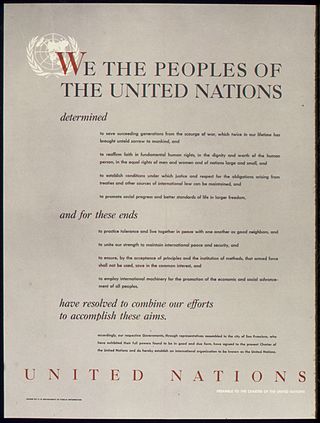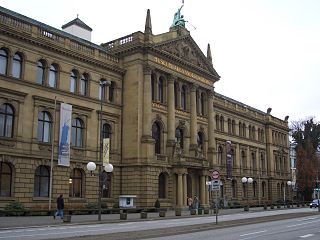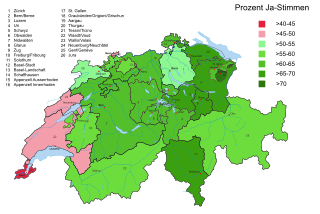
West Germany is the colloquial English term used to describe the Federal Republic of Germany from its formation on 23 May 1949 until the reunification of Germany through the accession of East Germany on 3 October 1990. During the Cold War, the western portion of Germany and the associated territory of West Berlin were parts of the Western Bloc. West Germany was formed as a political entity during the Allied-occupied Germany after World War II, established from 12 states formed in the three Allied zones of occupation held by the United States, the United Kingdom, and France. The FRG's provisional capital was the city of Bonn, and the Cold War–era country is retrospectively designated as the Bonn Republic.

The Basic Law for the Federal Republic of Germany is the constitution of the Federal Republic of Germany.

German reunification was the process of re-establishing Germany as a single full sovereign state, which took place between 9 November 1989 and 15 March 1991. The "Unification Treaty" entered into force on 3 October 1990, dissolving the German Democratic Republic and integrating its recently re-established constituent federated states into the Federal Republic of Germany to form present-day Germany. This date has been chosen as the customary German Unity Day, and has thereafter been celebrated each year as a national holiday in Germany since 1991. As part of the reunification, East and West Berlin of the two countries were also de facto united into a single city, which later eventually became the capital of this country.

A preamble is an introductory and expressionary statement in a document that explains the document's purpose and underlying philosophy. When applied to the opening paragraphs of a statute, it may recite historical facts pertinent to the subject of the statute. It is distinct from the long title or enacting formula of a law.

The 26 cantons of Switzerland are the member states of the Swiss Confederation. The nucleus of the Swiss Confederacy in the form of the first three confederate allies used to be referred to as the Waldstätte. Two important periods in the development of the Old Swiss Confederacy are summarized by the terms Acht Orte and Dreizehn Orte.

The Federal Republic of Germany, as a federal state, consists of sixteen states. Berlin, Hamburg and Bremen are called Stadtstaaten ("city-states"), while the other thirteen states are called Flächenländer and include Bavaria, Saxony, and Thuringia, which describe themselves as Freistaaten.

German Reich was the constitutional name for the German nation-state that existed from 18 January 1871 to 5 June 1945. The Reich became understood as deriving its authority and sovereignty entirely from a continuing unitary German Volk, with that authority and sovereignty being exercised at any one time over a unitary German "state territory" with variable boundaries and extent. Although commonly translated as "German Empire", the word Reich here better translates as "realm" or territorial "reach", in that the term does not in itself have monarchical connotations.

The Constitution of the Czech Republic is the supreme law of the Czech Republic. The current constitution was adopted by the Czech National Council on 16 December 1992. It entered into force on 1 January 1993, replacing the 1960 Constitution of Czechoslovakia and the constitutional act No. 143/1968 Col., when Czechoslovakia gave way to the Slovak Republic and the Czech Republic in a peaceful dissolution.
An entrenched clause or entrenchment clause of a constitution is a provision that makes certain amendments either more difficult or impossible to pass. Overriding an entrenched clause may require a supermajority, a referendum, or the consent of the minority party. The term eternity clause is used in a similar manner in the constitutions of Brazil, the Czech Republic, Germany, Greece, India, Iran, Italy, Morocco, Norway, and Turkey, but specifically applies to an entrenched clause that can never be overridden. However, if a constitution provides for a mechanism of its own abolition or replacement, like the German Basic Law does in Article 146, this by necessity provides a "back door" for getting rid of the "eternity clause", too.

During the French Revolutionary Wars, the revolutionary armies marched eastward, enveloping Switzerland in their battles against Austria. In 1798, Switzerland was completely overrun by the French and was renamed the Helvetic Republic. The Helvetic Republic encountered severe economic and political problems. In 1798 the country became a battlefield of the Revolutionary Wars, culminating in the Battles of Zürich in 1799.

The Parlamentarischer Rat was the West German constituent assembly in Bonn that drafted and adopted the constitution of West Germany, the Basic Law for the Federal Republic of Germany, promulgated on 23 May 1949.

The Federal Constitution of the Swiss Confederation of 18 April 1999 is the third and current federal constitution of Switzerland.
The preamble to the Canadian Charter of Rights and Freedoms is the introductory sentence to the Constitution of Canada's Charter of Rights and Constitution Act, 1982. In full, it reads, "Whereas Canada is founded upon principles that recognize the supremacy of God and the rule of law".

The Act of Mediation was issued by Napoleon Bonaparte, First Consul of the French Republic on 19 February 1803 to abolish the Helvetic Republic, which had existed since the invasion of Switzerland by French troops in 1798, and replace it with the Swiss Confederation. After the withdrawal of French troops in July 1802, the Republic collapsed. The Act of Mediation was Napoleon's attempt at a compromise between the Ancien Régime and a republic. This intermediary stage of Swiss history lasted until the Restoration of 1815. The Act also destroyed the statehood of Tarasp and gave it to Graubunden.

The periods of Restoration and Regeneration in Swiss history lasted from 1814 to 1847. "Restoration" is the period of 1814 to 1830, the restoration of the Ancien Régime (federalism), reverting the changes imposed by Napoleon Bonaparte on the centralist Helvetic Republic from 1798 and the partial reversion to the old system with the Act of Mediation of 1803. "Regeneration" is the period of 1830 to 1848, when in the wake of the July Revolution the "restored" Ancien Régime was countered by the liberal movement. In the Protestant cantons, the rural population enforced liberal cantonal constitutions, partly in armed marches on the cities. This resulted in a conservative backlash in the Catholic cantons in the 1830s, raising the conflict to the point of civil war by 1847.
An exclusive mandate is a government's assertion of its legitimate authority over a certain territory, part of which another government controls with stable, de facto sovereignty. It is also known as a claim to sole representation or an exclusive authority claim. The concept was particularly important during the Cold War period when a number of states were divided on ideological grounds.

The 42nd amendment, officially known as The Constitution Act, 1976, was enacted during the Emergency by the Indian National Congress government headed by Indira Gandhi.
The legal status of Germany concerns the question of the extinction, or otherwise continuation, of the German nation-state following the rise and downfall of Nazi Germany, and constitutional hiatus of the military occupation of Germany by the four Allied powers from 1945 to 1949. It became current once again when the German Democratic Republic joined the Federal Republic of Germany in 1990.

The federal popular initiative "against the construction of minarets" was a successful popular initiative in Switzerland to prevent the construction of minarets on mosques. In a November 2009 referendum, a constitutional amendment banning the construction of new minarets was approved by 57.5% of the participating voters. Only three of the twenty Swiss cantons and one half canton, mostly in the French-speaking part of Switzerland, opposed the initiative.

The preamble and the first title of the Swiss Federal Constitution of 18 April 1999 determine the general outlines of Switzerland as a democratic federal republic of 26 cantons governed by the rule of law.














